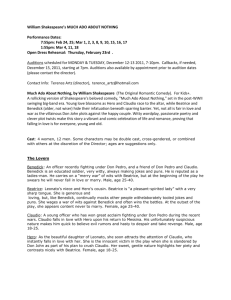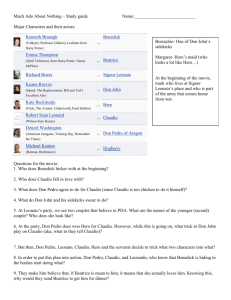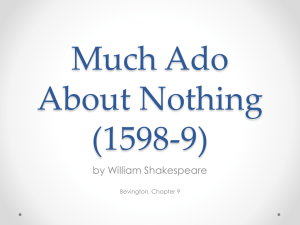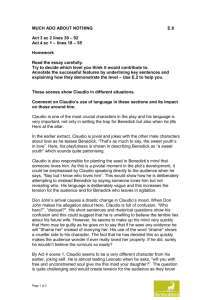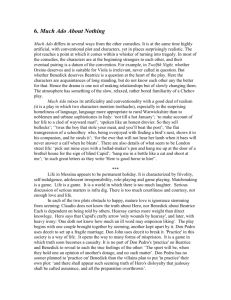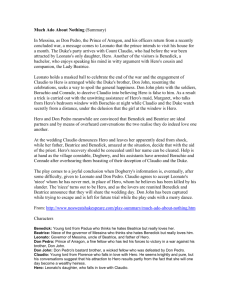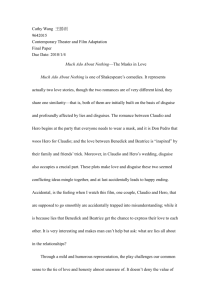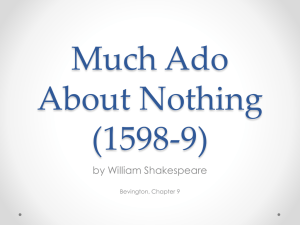englishcwk
advertisement
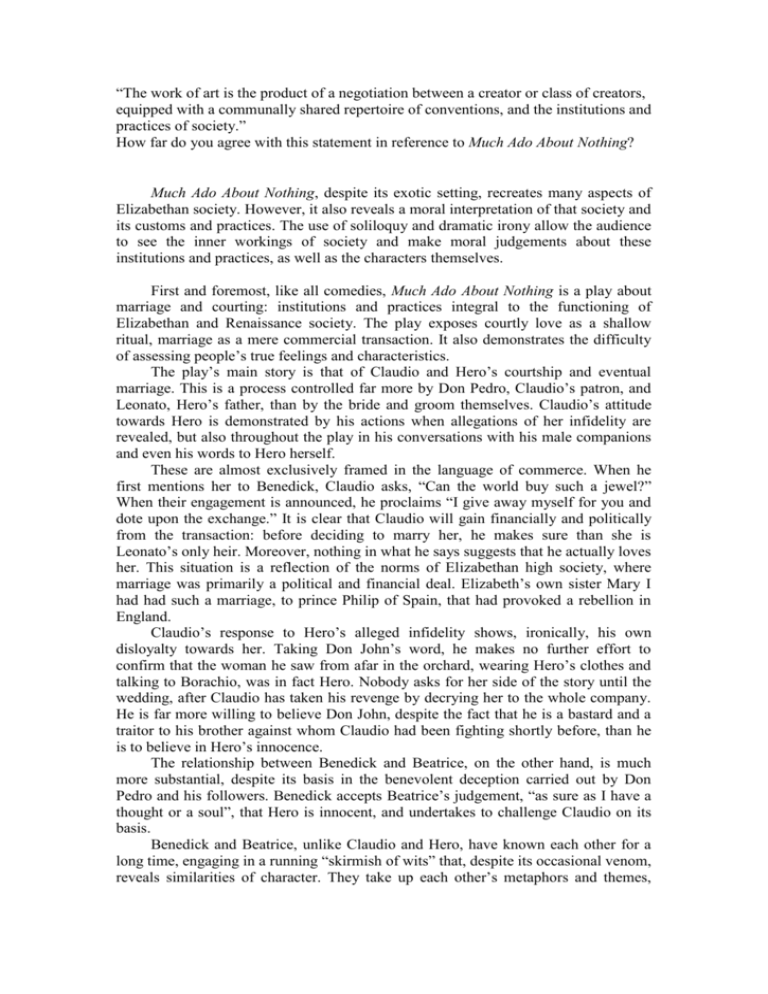
“The work of art is the product of a negotiation between a creator or class of creators, equipped with a communally shared repertoire of conventions, and the institutions and practices of society.” How far do you agree with this statement in reference to Much Ado About Nothing? Much Ado About Nothing, despite its exotic setting, recreates many aspects of Elizabethan society. However, it also reveals a moral interpretation of that society and its customs and practices. The use of soliloquy and dramatic irony allow the audience to see the inner workings of society and make moral judgements about these institutions and practices, as well as the characters themselves. First and foremost, like all comedies, Much Ado About Nothing is a play about marriage and courting: institutions and practices integral to the functioning of Elizabethan and Renaissance society. The play exposes courtly love as a shallow ritual, marriage as a mere commercial transaction. It also demonstrates the difficulty of assessing people’s true feelings and characteristics. The play’s main story is that of Claudio and Hero’s courtship and eventual marriage. This is a process controlled far more by Don Pedro, Claudio’s patron, and Leonato, Hero’s father, than by the bride and groom themselves. Claudio’s attitude towards Hero is demonstrated by his actions when allegations of her infidelity are revealed, but also throughout the play in his conversations with his male companions and even his words to Hero herself. These are almost exclusively framed in the language of commerce. When he first mentions her to Benedick, Claudio asks, “Can the world buy such a jewel?” When their engagement is announced, he proclaims “I give away myself for you and dote upon the exchange.” It is clear that Claudio will gain financially and politically from the transaction: before deciding to marry her, he makes sure than she is Leonato’s only heir. Moreover, nothing in what he says suggests that he actually loves her. This situation is a reflection of the norms of Elizabethan high society, where marriage was primarily a political and financial deal. Elizabeth’s own sister Mary I had had such a marriage, to prince Philip of Spain, that had provoked a rebellion in England. Claudio’s response to Hero’s alleged infidelity shows, ironically, his own disloyalty towards her. Taking Don John’s word, he makes no further effort to confirm that the woman he saw from afar in the orchard, wearing Hero’s clothes and talking to Borachio, was in fact Hero. Nobody asks for her side of the story until the wedding, after Claudio has taken his revenge by decrying her to the whole company. He is far more willing to believe Don John, despite the fact that he is a bastard and a traitor to his brother against whom Claudio had been fighting shortly before, than he is to believe in Hero’s innocence. The relationship between Benedick and Beatrice, on the other hand, is much more substantial, despite its basis in the benevolent deception carried out by Don Pedro and his followers. Benedick accepts Beatrice’s judgement, “as sure as I have a thought or a soul”, that Hero is innocent, and undertakes to challenge Claudio on its basis. Benedick and Beatrice, unlike Claudio and Hero, have known each other for a long time, engaging in a running “skirmish of wits” that, despite its occasional venom, reveals similarities of character. They take up each other’s metaphors and themes, shifting from one to another within a conversation, as in this example from Act I Scene i: Beat: I wonder that you will still be talking… Bene: … Are you yet [still] living? Beat: … Courtesy itself must convert to disdain… Bene: Then is courtesy a turncoat…/ I would… that I had not a hard heart… Beat: …I thank God for my cold blood… Both relationships are in a way set up by others: Don Pedro having done the courting of Hero and breaking with Leonato himself on behalf of Claudio, and the whole company having taken part in the plot to bring Benedick and Beatrice together. Both will result in marriage, as they properly should in a comedy, and yet it is clear that Benedick and Beatrice’s is right and good, and Claudio and Hero’s otherwise. That Claudio believes Hero has been unfaithful, and that he trusts Don John to such a degree, reflects the atmosphere of paranoia surrounding the question of female infidelity, and the male companionship established for the defence of male superiority. The bearing of children is the most important of a woman’s household duties and a rare vital aspect of society’ functioning controlled exclusively by women. The presence of Don John is a reminder of the social impact infidelity can have when it is recognised, endowing Don John with a social status utterly dependent on his halfbrother and turning him into a threat to the hierarchy of power. At the very beginning of the play, Leonato jokes that he is assured that Hero is his daughter: “Her mother hath many times told me so.” The legitimate succession of a dynasty is very much in the hands of the mother, and this is a dangerous threat to male power. In Shakespeare’s England, male superiority was further assaulted by the recent succession of women on the throne: first Mary and then her sister Elizabeth. Women’s power over men is a theme of Much Ado About Nothing, and it can be felt in other ways than their control over childbirth: for instance, Beatrice uses Benedick’s sense of chivalry to make him challenge Claudio, protesting that she wishes she were a man so she could do it herself. Why does the play contain no mother figures? Perhaps to demonstrate the ineptness of men, specifically Don Pedro, when they try to take on the social engineering role. The male camaraderie demonstrated by Don Pedro, Claudio and Benedick is to some extent a mechanism of self-defence, as is their bachelor status at the beginning of the play. Recognising the need for sons and heirs, however, Don Pedro must marry off his followers to trustworthy women like Hero: “That she is worthy, I know.” When it seems that she is not worthy of that trust, his scheme breaks down. It is only luck and the fact that both parties to the transaction – that is, both Don Pedro and Leonato – desire the marriage to go ahead that allows him to be extricated from the disaster. As well as rivalry between genders, there is also an element of class conflict. Although most of the action takes place among members of Messina’s ruling elite, the ordinary citizens of the Watch play an important role. It is they who save the situation for Don Pedro and Leonato by revealing Don John’s deception. Their social status is clearly defined on stage by their clothing, plain and dark compared to the exotic colours worn by the noblemen, and by their language. Like Benedick, Dogberry puts on an exterior show in the hope of “seeming” honourable and cultivated, by trying to affect the language of the court. His attempt, unlike Benedick’s, is completely transparent: he simply succeeds in making himself unintelligible. Dogberry, however, always tries to honestly express his meaning. Benedick, on the other hand, is projecting a false persona through his language, as he reveals in his soliloquy of Act II Scene iii and indeed in conversation with Claudio: “Do you question me as an honest man should do, for my simple true judgement, or would you have me speak after my custom, as a professed tyrant to their sex?” Thus, the play not only recreates the language barrier between rich and poor, but also shapes our interpretation of this social institution. Despite the outward signs, through clothing, for example, it is the Watch who are more honest and honourable than any of the other characters. The play is a reflection both of society and of a desire to change it. It is set among the accurately recreated institutions and practices of society, yet its fictional elements betray a moral element. Claudio is cast as a villain as well as Don John, for his misuse of courtship and marriage, and his betrayal of Hero. On the other hand, the deception of Beatrice and Benedick has beneficial results, and Benedick and Dogberry, despite their own deceptions, are the heroes of the play. The world of the play is to some extent a negotiation between the creator and his society, in that it is a work of fiction, and combines elements that derive from the creator’s imagination with those that derive from his surroundings. Rather than being forces acting in opposite directions and negotiating a compromise, however, the creator and his repertoire of conventions are more like a lens, and the institutions and practices of society his subject of observation. The artist does not negotiate with society, but shows it as it is, using stylisation and convention to emphasise certain elements to make his point. The literally unrealistic, stylised language of the characters allows the audience to understand and interpret their motives, and the conventions of comedy allow the play to pay special attention to the institution of marriage. “Negotiation” is an inadequate metaphor for the relationship between the creator and society, except in that it reflects how the work of art is influenced by the creator on one hand, and society on the other.

